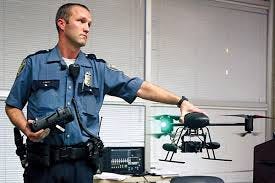Public outcry over drone surveillance by police, threatens to ground them before they hit civilian airspace.

Law enforcement groups were blindsided by the public outcry over drone surveillance and are now struggling to convince lawmakers to avoid making laws that would restrict their use, several industry sources said Thursday.
Proponents of unmanned aircraft say they can be used by police as a cheap alternative to manned aircraft on search and rescue missions, to get a different vantage point during potentially dangerous missions and to assist in manhunts. But as more police departments consider applying for Federal Aviation Administration permission to fly, outcry from the public and state lawmakers threatens to ground them before they hit civilian airspace.
Stephen Ingley, executive director of the Airborne Law Enforcement Association, argues that drones don't have any advanced spying capabilities, that the drones police officers are most interested in can only fly for 15 minutes at a time, and that they are unfeasible options for so-called "persistent surveillance."
But that hasn't stopped more than 30 states from considering legislation restricting drone use.
"This legislation happened so fast, with such a devastating blow that it took us all aback," he says.
Drone manufacturers have been planning to integrate their aircraft into American airspace for nearly a decade, but legislation passed last year in Congress made it easier for police departments to obtain authorization to fly them. Since then, groups such as the American Civil Liberties Union and the Electronic Privacy Information Center have lobbied hard for legislation that would keep law enforcement drones grounded.
During a Senate judiciary committee hearing Wednesday, Amie Stepanovich, EPIC's director of the Domestic Surveillance Project, argued that drones "greatly increase the capacity for law enforcement to collect personal information on individuals."
Clay Thomas, Program Chair of the Association for Unmanned Vehicle Systems International, says that the industry had attempted to warn the public that drones were coming, but that until integration actually started occurring, they went largely unnoticed.
"The panic mode has started," he says. "What we want to do is get the awareness out to the communities that there are real, useful purposes to use these—not just the Hollywood purposes they've seen overseas."
"Now that there's been this backlash, we're in reaction mode," he adds.
Ingley says his organization was completely taken aback by privacy defenders—his organization just sees drones as "a new tool in the toolbox that will save lives and will operate no differently than a helicopter."
"Nobody saw this coming—it was something that wasn't anticipated," he says. "It happened so fast and with such vigor that now what we have to do is backtrack and start educating people as to how these are actually being used."
http://www.usnews.com/news/articles/2013/03/21/law-enforcement-blindsided-by-public-panic-over-drone-privacy


